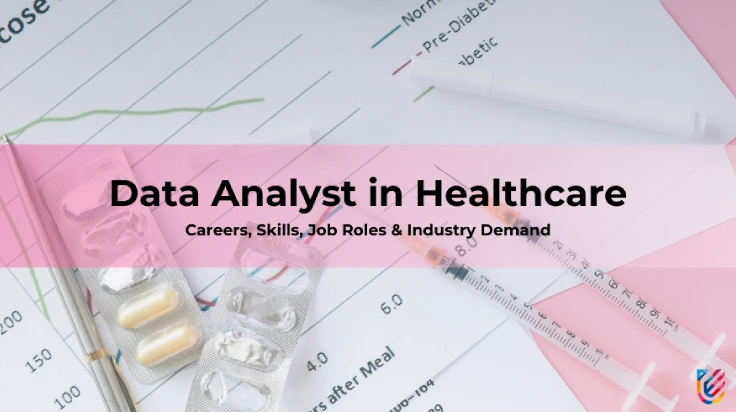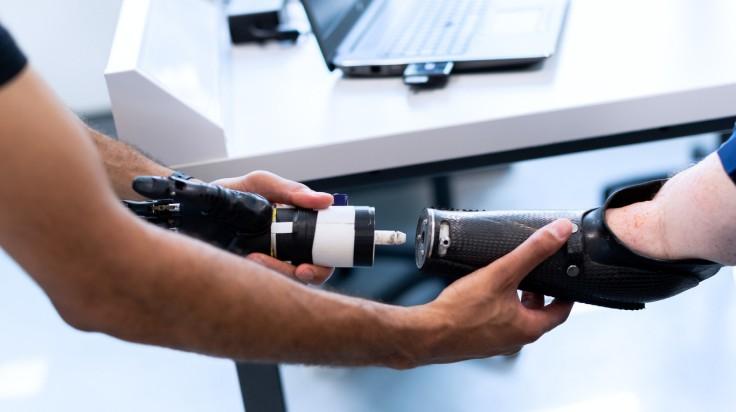Data Analyst in Healthcare: Careers, Skills, Job Roles & Industry Demand
- UPES Editorial Team
- Published 04/03/2025

Table of Contents:
The healthcare industry is undergoing a digital revolution, and data analytics in healthcare plays a crucial role in improving patient outcomes, optimizing operations, and reducing costs. If you’re exploring a career in this exciting field, becoming a data analyst in healthcare or a medical data analyst might be the perfect opportunity to combine your analytical skills with a meaningful purpose.
Become future-ready with our Health Sciences & Technology programs
Know MoreThis blog delves into healthcare data analyst careers, job roles, required skills, and how you can kickstart your journey with a healthcare data analytics course like the one offered by UPES School of Health Sciences and Technology.
What is Healthcare Analytics?
Healthcare analytics involves the systematic analysis of data related to patient care, medical procedures, pharmaceuticals, and healthcare operations. A data analyst in healthcare helps in identifying patterns, predicting trends, and making informed decisions through a systematic analysis of data, to improve efficiency and patient outcomes.
Key areas include:
- Clinical Analytics: Tracking patient data to enhance treatment plans.
- Operational Analytics: Streamlining hospital management and resource allocation.
- Pharmaceutical Analytics: Analyzing drug trials and optimizing supply chains.
Healthcare analytics is integral to improving the quality of care while managing costs, making it one of the fastest-growing fields in the industry.
Careers in Healthcare Data Analytics
The demand for healthcare data analyst jobs is soaring as the healthcare industry increasingly relies on data-driven decisions. Common career paths include:
1. Healthcare Data Analyst
Analyze patient and operational data to identify trends and provide actionable insights for hospitals and clinics.
2. Medical Data Analyst
Focus on clinical data to support medical research, improve patient care, and identify areas for innovation.
3. Pharmaceutical Data Analyst
Work with pharmaceutical companies to analyze drug trials, market performance, and supply chain efficiencies.
4. Health Informatics Specialist
Combine IT expertise with healthcare knowledge to manage electronic health records (EHR) and ensure data integrity.
5. Population Health Analyst
Use analytics to track and predict population health trends, helping to implement preventive care programs.
These roles span across hospitals, pharmaceutical companies, insurance firms, research institutions, and government agencies.
Job Roles and Responsibilities of a Healthcare Data Analyst
A healthcare data analyst job typically involves:
- Collecting and cleaning medical data from various sources, including EHRs and clinical trials.
- Analyzing patient outcomes to recommend treatment plans or operational improvements.
- Monitoring healthcare policies and ensuring compliance with data regulations.
- Visualizing data using tools like Tableau, Power BI, or Python to communicate findings effectively.
- Collaborating with medical professionals, administrators, and IT teams.
With their ability to transform raw data into actionable insights, data analysts in healthcare play a pivotal role in the industry's growth.
How to Become a Healthcare Data Analyst
If you're wondering how to become a healthcare data analyst, follow these steps to get started:
1. Educational Foundation
Pursue a degree in health sciences, data analytics, or related fields. A program like the B.Sc. in Health Sciences equips you with the necessary foundation in biology, healthcare systems, and analytics.
2. Specialize with a Healthcare Data Analytics Course
Opt for specialized training in healthcare data analytics courses that teach tools like SQL, Python, R, and Tableau. Understanding healthcare-specific standards such as HIPAA compliance is also essential.
3. Gain Hands-On Experience
Internships or entry-level roles in hospitals, pharmaceutical companies, or research institutions provide practical exposure to real-world challenges in healthcare data analytics jobs.
4. Build Analytical and Technical Skills
Learn data visualization, statistical modelling, and machine learning techniques. Familiarity with big data platforms like Hadoop or cloud solutions such as AWS is a plus.
5. Obtain Certifications
Certifications like Certified Health Data Analyst (CHDA) or relevant courses in healthcare informatics add significant value to your resume.
6. Stay Updated with Industry Trends
Healthcare analytics evolves rapidly, so staying informed about new technologies and methodologies is crucial for career growth.
Skills Required for Healthcare Data Analysts
To succeed as a healthcare data analyst, you’ll need a mix of technical and soft skills:
Technical Skills
- Data & Business Analysis Tools: Proficiency in Excel, SQL, Python, or R.
- Data Visualization: Ability to create impactful dashboards using Tableau or Power BI.
- Healthcare Systems Knowledge: Understanding EHR systems, clinical workflows, and healthcare terminologies.
- Regulatory Compliance: Knowledge of healthcare laws like HIPAA.
Soft Skills
- Communication: Convey complex data insights to non-technical stakeholders.
- Problem-Solving: Identify issues and recommend data-driven solutions.
- Attention to Detail: Ensure accuracy in data collection and reporting.
A data analyst in healthcare is a mixture of technical as well as soft skills to ace his job well.
Industry Demand for Healthcare Data Analysts
The healthcare industry generates vast amounts of data every day, and the need for skilled professionals to interpret this data is greater than ever. Key trends driving demand include:
- The adoption of electronic health records (EHRs).
- Growth in telemedicine and wearable health technologies.
- Increased focus on value-based care and cost optimization.
- Rising investment in AI and machine learning for healthcare applications.
According to the Bureau of Labor Statistics, employment for healthcare data analyst jobs is projected to grow faster than average in the coming decade.
Salary Expectations in Healthcare Data Analytics
A career as a healthcare data analyst is not only fulfilling but also financially rewarding:
- Entry-Level Positions: ₹4-7 LPA in India or $50,000-$65,000 annually in the US.
- Mid-Level Roles: ₹8-15 LPA or $70,000-$90,000.
- Senior Positions: ₹16-25 LPA or $100,000-$130,000.
Specialized roles, like pharmaceutical data analysts, often command higher salaries due to the complexity of their work.

Our counsellors are just a click away.
Conclusion
The role of a data analyst in healthcare is pivotal in transforming healthcare into a data-driven industry. Whether analyzing patient outcomes, optimizing operations, or supporting medical research, these professionals make a significant impact on healthcare quality and efficiency.
To embark on this promising career path, consider pursuing a degree like the B.Sc. in Health Sciences at UPES. This program offers a blend of healthcare knowledge and analytical skills to prepare you for a thriving career in healthcare data analytics jobs.
Start your journey today and contribute to shaping the future of healthcare!
UPES Editorial Team
Written by the UPES Editorial Team
UPES Admission Enquiry
Subscribe to UPES Blogs
Join our community for exclusive stories, insights, and updates
By clicking the "Subscribe" button, I agree and accept the privacy policy of UPES.


































